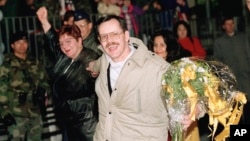Terry Anderson, a longtime Associated Press correspondent held hostage in Lebanon for nearly seven years, has died at the age of 76.
A former Marine who fought in Vietnam, Anderson switched to journalism and reported on the Middle East.
The journalist’s daughter, Sulome Anderson, said Sunday that the veteran journalist died at his home in Greenwood Lake, New York. The cause of death was complications from recent heart surgery, she said in a statement.
Julie Pace, executive editor of the AP, paid tribute to Anderson.
“Terry was deeply committed to on-the-ground eyewitness reporting and demonstrated great bravery and resolve, both in his journalism and during his years held hostage. We are so appreciative of the sacrifices he and his family made as the result of his work,” she said.
In 1985, Anderson was one of several Westerners kidnapped by Hezbollah during a time of civil war in Lebanon.
Supported by Iran, the militants indicated they were retaliating against Israel’s use of American weapons in earlier strikes on Lebanon. Over the course of 2,454 days, Anderson was held hostage in around 20 locations across Lebanon.
He was released in 1991 as the civil war ended. After being freed, Anderson met his daughter for the first time, when she was six years old. The journalist’s partner had been pregnant when the militants took him captive.
Speaking to the AP, Sulome Anderson said of her father, “He never liked to be called a hero, but that’s what everyone persisted in calling him.”
“I saw him a week ago and my partner asked him if he had anything on his bucket list, anything that he wanted to do. He said, ‘I’ve lived so much and I’ve done so much. I’m content,’” she added.
Over the years, Anderson taught at various journalism programs including the Columbia Graduate School of Journalism, Scripps School of Journalism at Ohio University, and the University of Florida.
He was also involved with advocacy groups including the Committee to Protect Journalists, or CPJ, where he served as an honorary chair, and the Vietnam Children’s Fund.
“Anderson’s public advocacy was instrumental in freeing journalists from jail and protecting them against the worst abuses,” former CPJ Executive Director Joel Simon said in a statement.
“But what distinguished Terry was his personal and often private interventions on behalf of journalists held hostage around the world. Terry counseled many families experiencing helplessness and trauma. His deep compassion helped them understand they were not alone and bolstered their spirits in the darkest times," Simon added.
The National Press Club also paid tribute to Anderson, saying in a statement that he “reminded us that journalism is a dangerous business, and foreign correspondents, in particular, take great personal risk to keep the public informed.”
For several years, Anderson was the longest-held American journalist hostage. That distinction is now held by Austin Tice, a journalist held in Syria for almost 12 years.












